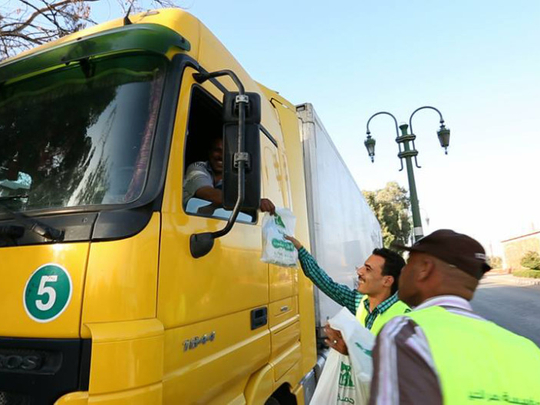
Cairo: “Charity is becoming more expensive these days,” says Hajj Mahmud as he hands out packets of free food in an alleyway in northern Cairo.
“The crazy increases in prices of everything make it hard to feed all the poor during Ramadan,” the 62-year-old timber merchant adds, referring to Ramadan when Muslims abstain from eating, drinking and smoking from dawn to dusk every day.
A few hours before the sunset, a crowd of people would show up to get their daily intake of food from Hajj Mahmoud, marking an age-old Ramadan feature known in mostly Muslim Egypt as Mawaed Al Rahman, translating as “tables of the merciful”.
For long years, wealthy people would pay for hosting the poor at large charity meals held on the streets during Ramadan.
However, recent price spikes in Egypt has obviously taken its toll on these street parties.
“Some years ago, I used to hold a big banquet for the passers-by at the time of iftar [end of fast] in Ramadan, offering cooked chickens, juices and desserts. In the good old days, this would cost no more than 15,000 [Egyptian] pounds (Dh3,061) including the wages of the cooks and the rent fees of the food tables and the tent where the food was served,” Hajj Mahmud told Gulf News.
“But, some days before Ramadan this year, I was told that a month-long banquet would cost more than 50,000 pounds. This jump in the cost is due to the [pound] flotation that has made prices of everything go up.”
In November last year, Egypt floated its local currency and cut fuel subsidy as part of harsh economic reforms that secured the country an IMF loan of $12 billion (Dh44 billion) over a period of three years.
The measures have triggered sharp rises in prices of food and services in this country of 93 million and resulted in record-high inflation rates.
The government has promised to expand social support programmes for the poor and the limited-income class in order to cushion the impact of economic reforms.
Like other Egyptians who used to host street charity parties in Ramadan, Hajj Mahmud has changed a few things in order to preserve the tradition of food charity. He has now begun giving away cooked meals to recipients at home instead of putting up tents in the street, thus cutting on costs.
“I no longer need to rent tables, seats and tents that can now cost up to 10,000 pounds during the month depending on the size of the place,” says the man, who has refused to give his full name for fear of appearing showy. “Doing goodness is not about names. Its aim is just to help the poor in order to please Allah and get His reward.”
Ashraf Abdul Halim, a cleaning worker at a nearby clothes shop, has been a beneficiary of Hajj Mahmud’s benevolence for several years.
“I used to eat at his table every Ramadan because I can’t go to my house for the iftar meal and then return to work later in the evening. It is a long distance,” says Abdul Halim, who lives in the Cairo suburb of Al Alag.
“May God reward the hajj for continuing to feed the poor despite the high prices of food,” adds the father of two. “The food packets he distributes this Ramadan are delicious. They include chicken, rice and cooked vegetables, in addition to dried dates soaked in milk. I now take my iftar meal from him and eat it inside the store. The Mawaed Al Rahman [street charity tables] have almost disappeared as a result of fiery [soaring] prices.”
A government crackdown on charitable associations, suspected of links with the now-banned Muslim Brotherhood, is believed to have curbed the availability of free meals in Ramadan. These groups were main providers of the food.
In the run-up to this year’s Ramadan, licensed charities, financed by donations, planned to fill the vacuum.
Misr Al Kheir, a non-governmental charity led by Shaikh Ali Jumaa, Egypt’s former Grand Mufti, is undertaking a major project to provide iftar meals to around 5 million people every day across the country.
Misr Al Kheir and other charities also deliver charity food boxes to the less fortunate right to their doorstep.
These boxes include dried foods such as lentils, rice, macaroni, yameesh (a mixture of dried fruit and nuts), edible oil and other goodies needed in Ramadan when consumption rates usually increase.
During Ramadan, volunteers can be seen on Egypt’s streets and highways in the pre-sunset hours distributing juices and dried dates to the people, who for one reason or another, have failed to be at home for the iftar meal.
Muslims traditionally break their fast in Ramadan by eating dates, following the example of the Prophet Mohammad (PBUH)).
The tradition of street charity parties in Egypt dates back to the 9th Century, according to some historians. It was initiated by Ahmad Ibn Tolun, who ruled Egypt for 16 years starting from 868AD.
In recent years, some politicians, parliamentary hopefuls and entertainers have capitalised on the tradition apparently to boost their popularity by funding the provision of charity meals in Ramadan.












